Creating a dedicated self-care space can be a game-changer for your daily routine and overall well-being. A self-care relaxation corner is more than just a quiet spot; it’s a haven where you can unwind and recharge.
By designing a space that promotes relaxation, you can improve your mental health and reduce stress. This involves choosing the right elements, from calming colors to soothing textures, that help you feel calm and centered.
Key Takeaways
- Create a quiet and comfortable space for relaxation
- Choose calming elements like colors and textures
- Make it a habit to spend time in your self-care space daily
- Customize your space to suit your personal preferences
- Enjoy the benefits of reduced stress and improved well-being
The Benefits of Creating a Dedicated Self-Care Space
In today’s fast-paced world, having a dedicated space for self-care is more important than ever. As individuals increasingly seek ways to manage stress and improve their overall well-being, a self-care relaxation corner can play a vital role.
A well-designed diy relaxation corner can have numerous benefits, ranging from physical health improvements to mental health advantages. Let’s explore these benefits in more detail.
Physical Health Benefits
A dedicated self-care space can contribute to improved physical health in several ways. For instance, a relaxation corner can help reduce muscle tension and improve sleep quality. By incorporating elements like comfortable seating and soothing lighting, individuals can create a space that promotes relaxation and rejuvenation.
Mental Health Advantages
The mental health benefits of a self-care relaxation corner are equally significant. A quiet, calming space can help reduce stress and anxiety, promoting a sense of calm and well-being. By creating a space that fosters mindfulness and relaxation, individuals can better manage mental health challenges.
Improved Work-Life Balance
Having a dedicated self-care space can also contribute to a better work-life balance. By creating a clear distinction between work and relaxation spaces, individuals can more easily transition between work and personal time, reducing the likelihood of burnout and improving overall quality of life.
By incorporating a relaxation corner design that suits individual needs, people can reap the benefits of a dedicated self-care space, leading to a more balanced and healthy lifestyle.
Choosing the Perfect Location for Your Relaxation Corner
To create an effective relaxation corner, it’s vital to choose a location that promotes calmness and serenity. The right location can enhance the benefits of your self-care sanctuary, making it a haven where you can unwind and recharge.
Assessing Available Space in Your Home
Begin by evaluating the available space in your home to determine the most suitable location for your relaxation corner. Consider the layout of your living areas and identify spaces that are not frequently used or are underutilized. Measure the dimensions of the potential areas to ensure they can accommodate your envisioned setup.
Considering Natural Light and Ventilation
Natural light and ventilation play a significant role in creating a relaxing atmosphere. Opt for a location that receives plenty of natural light, as it can boost your mood and energy levels. Additionally, ensure that the area has good ventilation to maintain a fresh and healthy environment.
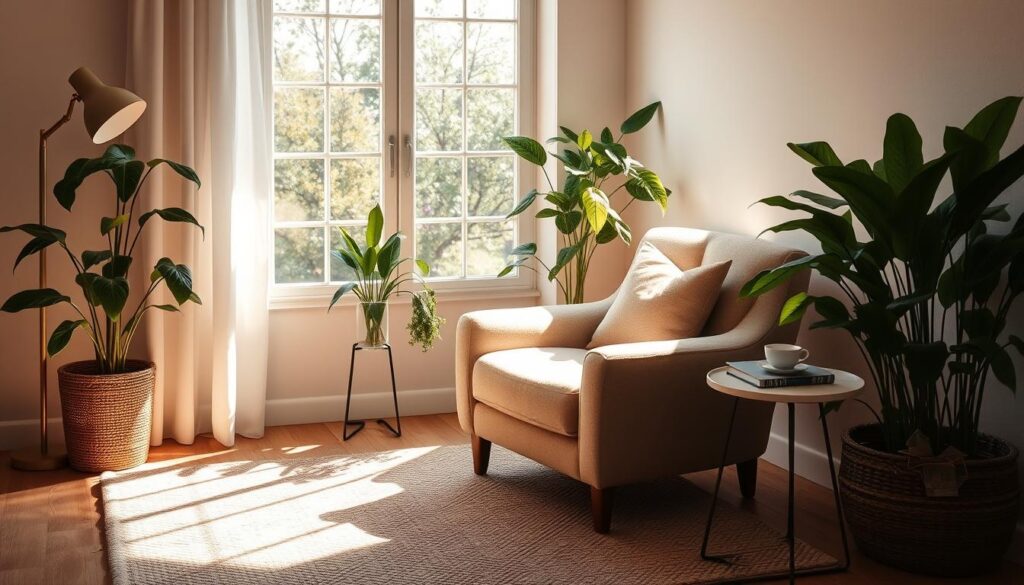
Evaluating Noise Levels and Privacy
A quiet and private location is essential for a relaxation corner. Assess the noise levels in different areas of your home and choose a spot that is away from high-traffic zones and external noise sources. Consider the privacy of the location as well, ensuring that it’s a space where you can be alone with your thoughts.
Making Use of Awkward or Unused Spaces
Don’t overlook awkward or unused spaces in your home. Areas like underutilized corners or spaces beneath staircases can be transformed into cozy relaxation nooks. Think creatively about how to utilize these spaces to create a unique and peaceful retreat.
| Location Factor | Ideal Condition | Benefit |
|---|---|---|
| Natural Light | Plenty of sunlight | Boosts mood and energy |
| Noise Level | Quiet | Enhances relaxation |
| Privacy | Private | Promotes sense of safety |
| Ventilation | Good airflow | Maintains a healthy environment |
Essential Elements of a Self-Care Relaxation Corner
The art of setting up a relaxation corner lies in balancing comfort with aesthetics. A well-crafted self-care space can significantly enhance one’s ability to unwind and rejuvenate.
Comfortable Seating Options
A crucial element in any relaxation corner is comfortable seating. This could be a plush armchair, a cozy reading nook with pillows, or even a hammock for the more adventurous. The key is to choose seating that invites relaxation and supports good posture.
Lighting Considerations
Lighting can dramatically affect the ambiance of a relaxation corner. Soft, warm lighting is often preferred as it creates a calming atmosphere. Consider using table lamps, floor lamps, or string lights to achieve the desired effect.
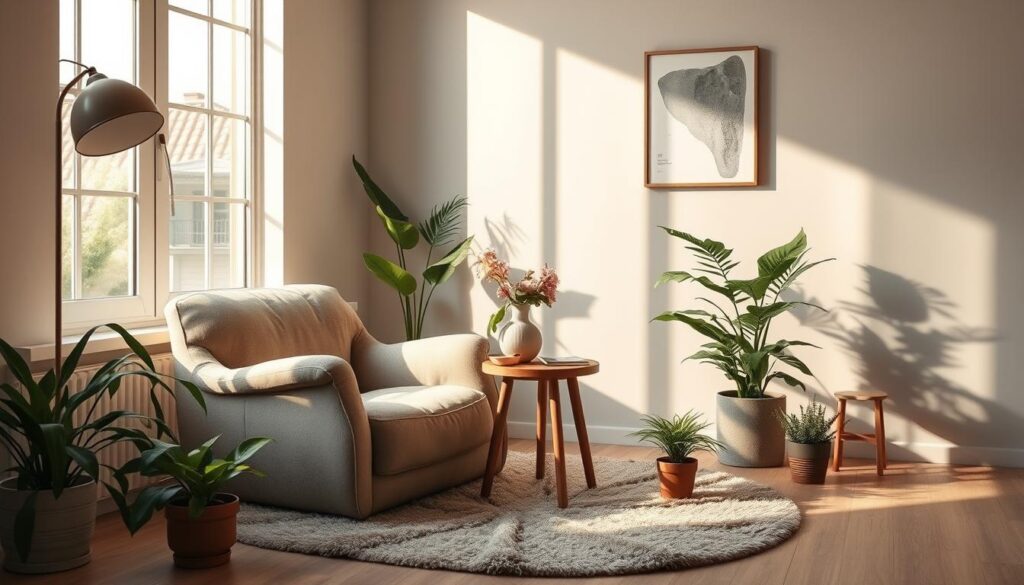
Storage Solutions for Self-Care Items
Having a dedicated place to store self-care items such as candles, essential oils, and meditation accessories can keep the space organized and clutter-free. Consider using baskets, shelves, or storage ottomans.
Plants and Natural Elements
Incorporating plants and natural elements can enhance the calming effect of a relaxation corner. Plants like lavender and peace lilies are not only beautiful but also promote relaxation. Adding natural elements such as wood or stone can further create a sense of serenity.
| Element | Purpose | Examples |
|---|---|---|
| Comfortable Seating | Relaxation and Support | Plush armchairs, Reading nooks, Hammocks |
| Lighting | Ambiance and Mood | Table lamps, Floor lamps, String lights |
| Storage | Organization and Accessibility | Baskets, Shelves, Storage ottomans |
| Plants and Natural Elements | Calming and Serenity | Lavender, Peace lilies, Wood, Stone |
By incorporating these essential elements, you can create a self-care relaxation corner that is both inviting and rejuvenating, perfect for unwinding after a long day.
How to Set Up a Relaxation Corner for Self-Care: Step-by-Step Guide
The process of setting up a relaxation corner involves several key steps that can enhance your self-care routine. By following these steps, you can create a space that fosters relaxation and rejuvenation.
Clearing and Preparing Your Space
Begin by clearing the area where you plan to set up your relaxation corner. Remove any clutter or distractions to create a clean slate. As the renowned interior designer, Kelly Wearstler, once said, “The first step in creating a beautiful space is to clear out the old to make way for the new.”
“The first step in creating a beautiful space is to clear out the old to make way for the new.” – Kelly Wearstler
Next, assess the space for any potential issues such as drafts, dampness, or excessive noise. Addressing these concerns will help ensure your relaxation corner is comfortable and conducive to relaxation.
Arranging Furniture and Key Elements
Once your space is prepared, it’s time to arrange your furniture and key elements. Start with comfortable seating options such as a plush armchair or a meditation cushion. Consider the layout of your space and how you can create a flow that promotes relaxation.
For example, you can create a cozy reading nook with a comfortable chair, a floor lamp, and a side table. 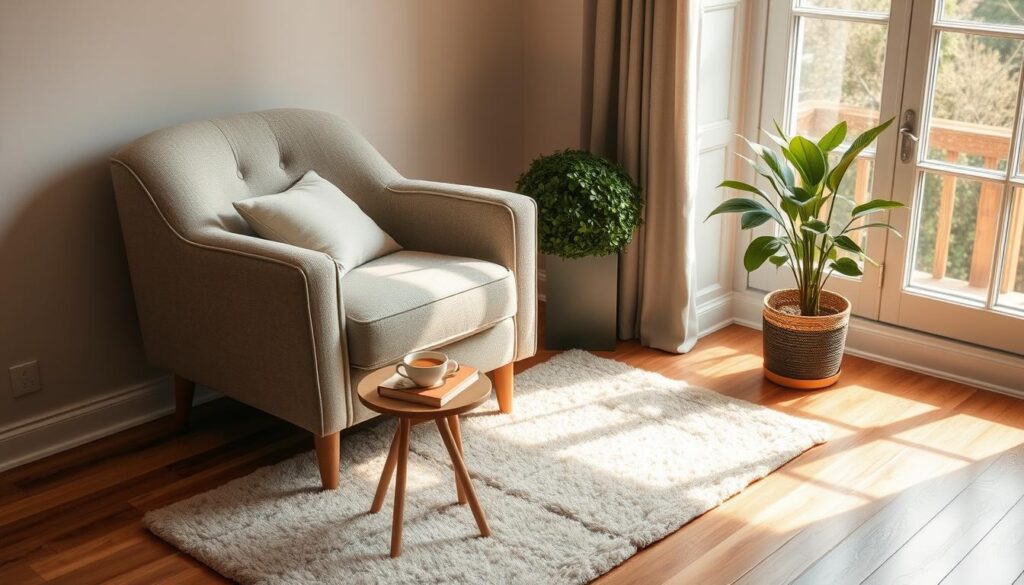
Adding Personal Touches
Personal touches can make your relaxation corner truly special. Add elements that bring you joy and calmness, such as family photos, artwork, or sentimental objects. You can also incorporate plants, candles, or aromatherapy diffusers to enhance the ambiance.
A table can help illustrate some personal touches you can add:
| Personal Touch | Benefit |
|---|---|
| Family Photos | Creates a sense of warmth and connection |
| Artwork | Stimulates creativity and calmness |
| Plants | Purifies the air and promotes relaxation |
Testing and Adjusting Your Layout
After setting up your relaxation corner, test it out and make any necessary adjustments. Spend some time in your new space and see how it feels. You may need to tweak the layout or add/remove elements to achieve the perfect balance.
By following these steps, you can create a relaxation corner that is tailored to your needs and enhances your self-care routine. Remember, the key is to create a space that feels comfortable and relaxing to you.
Creating a Sensory-Rich Environment
To maximize the benefits of your relaxation corner, focus on crafting a sensory experience. A well-designed space can engage multiple senses, promoting a deeper state of relaxation and rejuvenation.
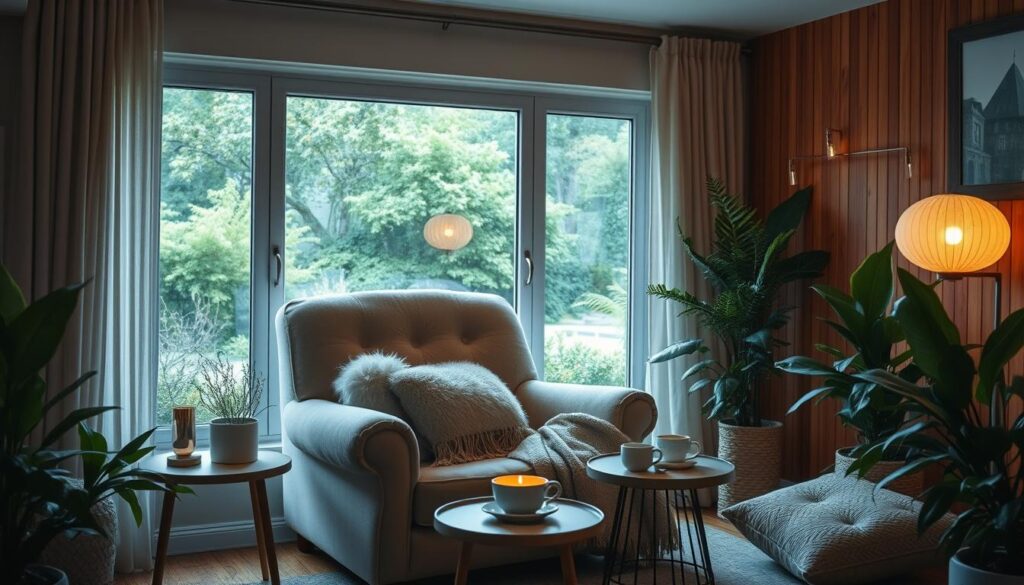
Incorporating Aromatherapy
Aromatherapy is a powerful tool for creating a relaxing atmosphere. Certain scents, such as lavender and vanilla, are known for their calming effects. Consider using essential oils in a diffuser or applying them to your pulse points during relaxation sessions.
Adding Soothing Sounds
Soothing sounds can significantly enhance the relaxation experience. Options include nature sounds, white noise, or soft instrumental music. You can use a sound machine or a mobile app to create the desired ambiance.
Selecting Textures That Comfort
The textures in your relaxation corner can greatly impact your comfort level. Incorporate plush throw blankets, soft cushions, and comfortable rugs to create a cozy environment. These elements invite you to relax and stay awhile.
Color Psychology for Relaxation
Colors can influence mood and relaxation levels. Calming colors such as blues, greens, and neutral tones can promote serenity. Consider the color palette when selecting furniture, rugs, and decor for your relaxation corner.
By incorporating these sensory elements, you can create a relaxation corner that is not only visually appealing but also a haven for relaxation and self-care. Experiment with different combinations to find what works best for you.
- Use aromatherapy to create a calming atmosphere
- Incorporate soothing sounds to enhance relaxation
- Select comfortable textures for a cozy environment
- Apply color psychology principles to promote serenity
Creating a sensory-rich environment in your relaxation corner is a journey. Start with the elements that resonate with you the most, and don’t hesitate to make adjustments as you continue to use the space.
Budget-Friendly Ideas for Your DIY Relaxation Corner
Transforming a corner of your home into a relaxation sanctuary doesn’t have to break the bank. With a little creativity and resourcefulness, you can create a serene space that fosters self-care and relaxation.
Upcycling Existing Furniture
One of the most cost-effective ways to furnish your relaxation corner is by upcycling existing furniture. Consider repurposing an old armchair or a vintage sofa by reupholstering it with calming fabrics. You can also breathe new life into a wooden chair by adding a fresh coat of paint or varnish.
Affordable Decor Options
Decorating your relaxation corner on a budget is achievable with some smart choices. Opt for affordable decor options like candles, plants, and wall art that reflect a calming ambiance. You can also repurpose items you already have, such as using old jars for storing small items or turning an old ladder into a bookshelf.
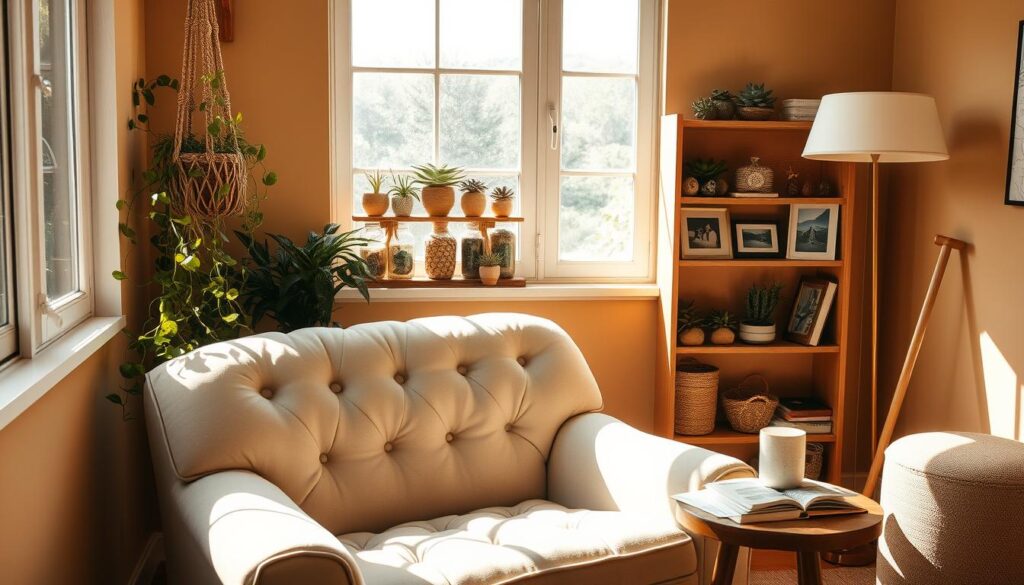
Prioritizing Essential Elements
When setting up your DIY relaxation corner, it’s crucial to prioritize the essential elements that promote relaxation. Focus on incorporating comfortable seating, soothing lighting, and calming colors. These elements will help create a peaceful atmosphere without breaking the bank.
Gradual Building and Upgrading
Building your relaxation corner gradually allows you to spread out the costs over time. Start with the basics and gradually add more elements as you go along. This approach not only helps with budgeting but also gives you the flexibility to adjust and upgrade your space according to your preferences.
Some key elements to consider when gradual building include:
- Comfortable seating
- Soothing lighting options
- Calming colors and textures
- Personal and meaningful decor
By following these budget-friendly ideas, you can create a serene and inviting DIY relaxation corner that enhances your self-care routine without straining your finances.
Themed Relaxation Corner Ideas
Transforming a corner of your home into a relaxation haven can be a game-changer for your self-care routine. By incorporating a thoughtful design, you can create a space that nurtures both body and mind. Here are some inspiring themed relaxation corner ideas to get you started.
Zen Meditation Space
A Zen meditation space is designed to promote mindfulness and inner peace. To create this serene atmosphere, incorporate natural elements like bamboo, stone, and wood. Use a neutral color palette and add a comfortable meditation cushion or chair. Consider adding a water feature or a wind chime to enhance the calming ambiance.
Reading Nook Sanctuary
A reading nook sanctuary is perfect for book lovers. Create a cozy retreat by selecting a comfortable chair or hammock, and surround it with floor lamps or a cozy overhead light. Add a side table or bookshelf to keep your favorite reads within reach. Consider incorporating plush throw blankets and pillows in soothing colors to create a warm and inviting atmosphere.
Nature-Inspired Retreat
Bring the outdoors in by creating a nature-inspired retreat. Incorporate elements like plants, a water feature, or a natural stone wall to create a calming ambiance. Use earthy tones and natural textures to enhance the connection with nature. Consider adding a comfortable seating area or a hammock to relax and unwind.
Cozy Hygge Corner
Hygge (pronounced hoo-gah) is a Danish concept that embodies coziness and warmth. Create a cozy hygge corner by incorporating soft lighting, plush throw blankets, and comfortable seating. Add warm-toned candles, a fireplace, or a wood-burning stove to create a warm and inviting atmosphere. Consider incorporating natural elements like wood and stone to enhance the cozy feel.
Artistic Expression Space
An artistic expression space is perfect for creatives. Design a space that inspires self-expression by incorporating art supplies, a comfortable workspace, and good lighting. Consider adding a vision board or inspirational quotes to stimulate creativity. Use a mix of colors and textures to create a vibrant and stimulating atmosphere.
| Theme | Key Elements | Ambiance |
|---|---|---|
| Zen Meditation Space | Natural elements, neutral colors, meditation cushion | Serene, peaceful |
| Reading Nook Sanctuary | Comfortable seating, floor lamps, bookshelves | Cozy, inviting |
| Nature-Inspired Retreat | Plants, water feature, natural stone | Calming, natural |
| Cozy Hygge Corner | Soft lighting, plush throw blankets, warm-toned candles | Warm, cozy |
| Artistic Expression Space | Art supplies, comfortable workspace, inspirational quotes | Vibrant, stimulating |
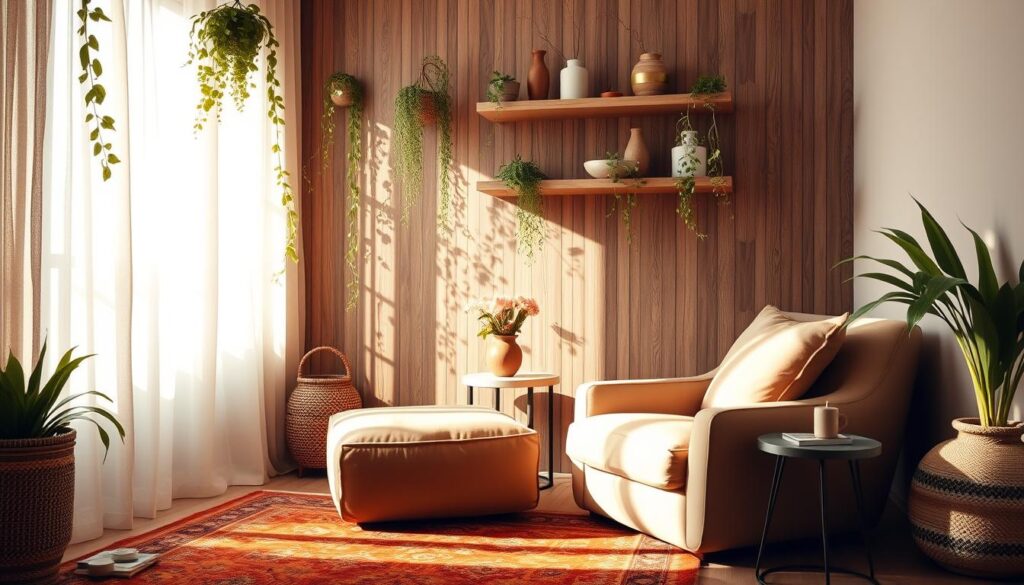
By incorporating one of these themed relaxation corner ideas into your home, you can create a sanctuary that promotes relaxation, self-care, and overall well-being.
Tech Elements to Enhance Your Self-Care Space
By integrating specific tech elements, you can create a more conducive environment for relaxation and mindfulness in your self-care sanctuary.
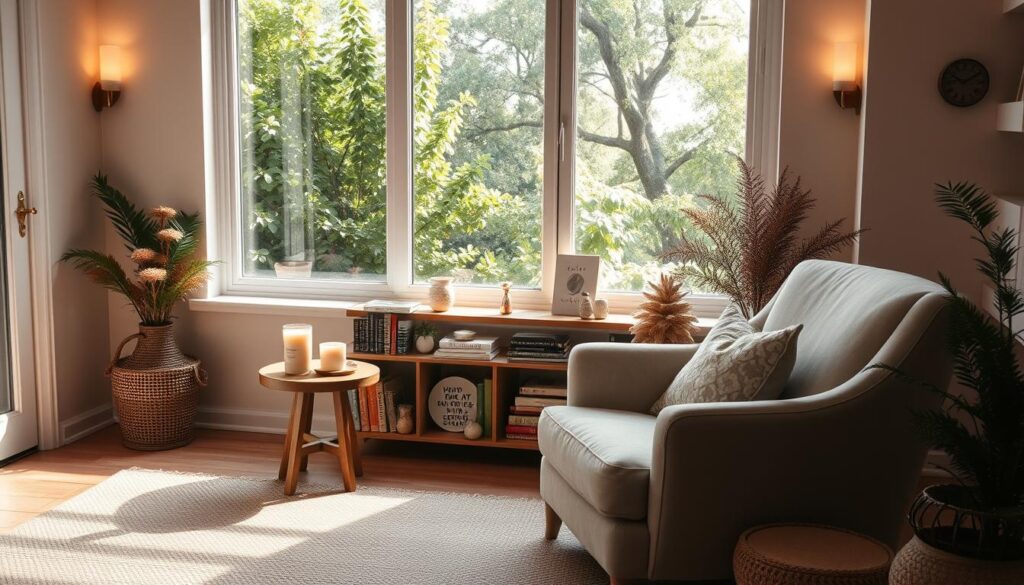
Technology can play a significant role in enhancing your self-care experience. One of the key ways to achieve this is through the use of various digital tools and smart devices.
Meditation and Mindfulness Apps
Meditation and mindfulness apps, such as Headspace and Calm, offer guided sessions that can help you relax and focus. These apps provide a variety of content, from meditation exercises to sleep stories, designed to enhance your mental well-being.
Smart Lighting Systems
Smart lighting can significantly impact the ambiance of your self-care space. Systems like Philips Hue allow you to adjust lighting colors and brightness to create a relaxing atmosphere, simulating natural daylight or a calming sunset.
Sound Machines and Music Solutions
Sound machines and curated music playlists can also enhance your relaxation experience. Apps like Noisli and Rainy Mood offer customizable soundscapes that can help mask distracting noises and promote relaxation.
Digital Detox Considerations
While technology can enhance your self-care space, it’s essential to consider digital detox practices. Setting boundaries on your tech use can help you fully disconnect and recharge.
By thoughtfully incorporating these tech elements, you can create a self-care space that supports both your mental and physical well-being.
Common Mistakes to Avoid When Setting Up Your Relaxation Corner
When setting up a relaxation corner, it’s easy to make mistakes that can undermine its purpose. A well-intentioned space can become less effective if not designed with care.
Overlooking Comfort for Aesthetics
One common mistake is prioritizing aesthetics over comfort. While a beautiful space is pleasing, it’s essential to ensure that the seating, lighting, and overall ambiance promote relaxation.
Creating a Multi-Purpose Space That Doesn’t Relax
Another error is creating a multi-purpose space that doesn’t serve its intended relaxing function. Avoid combining your relaxation corner with a workspace or other high-activity areas.
Ignoring Personal Preferences
Ignoring personal preferences is also a significant mistake. Your relaxation corner should reflect your personal tastes and needs.
Overcomplicating the Setup Process
Lastly, overcomplicating the setup process can lead to frustration. Keep your design simple and focus on the elements that bring you peace.
| Mistake | Impact | Solution |
|---|---|---|
| Overlooking Comfort | Reduced relaxation benefits | Prioritize comfortable seating and soothing ambiance |
| Multi-Purpose Space | Diluted relaxation effect | Designate the space solely for relaxation |
| Ignoring Personal Preferences | Lack of personal connection | Incorporate personal elements and tastes |
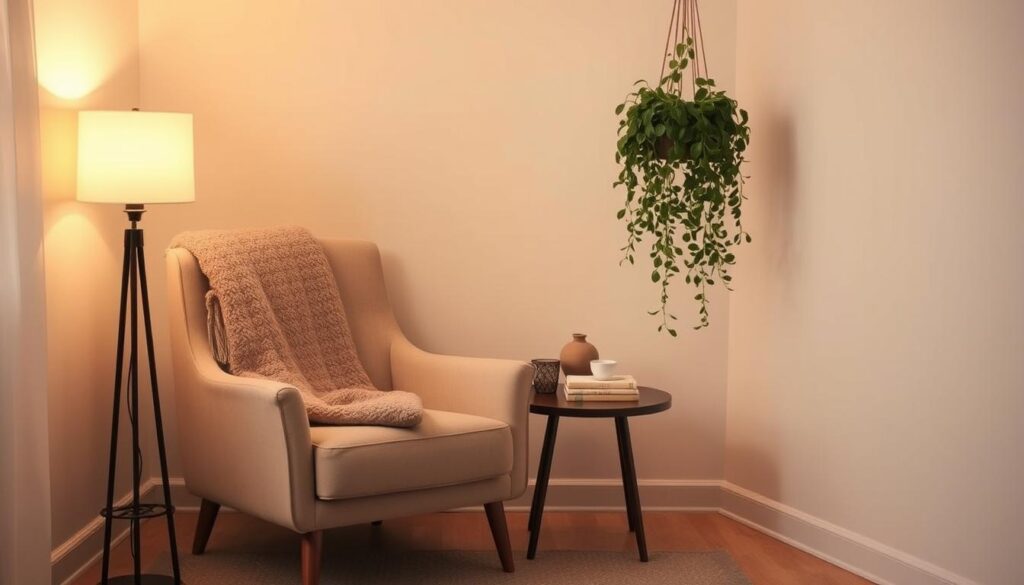
Maintaining and Refreshing Your Relaxation Corner
Maintaining your self-care sanctuary is just as important as setting it up. A well-maintained relaxation corner can significantly enhance your self-care routine, providing a peaceful retreat from the stresses of daily life.
Regular Cleaning Routines
Establishing a regular cleaning routine is essential for maintaining a serene and inviting relaxation corner. Dusting, vacuuming, and wiping down surfaces will keep your space clean and hygienic. Consider setting aside time each week to tidy up and refresh your sanctuary.
Seasonal Updates
To keep your relaxation corner feeling fresh and relevant, consider making seasonal updates. This could involve changing the colors, textures, or decorative elements to reflect the current season. For example, adding warm lighting and cozy throws in winter or incorporating natural elements like flowers and branches in spring.
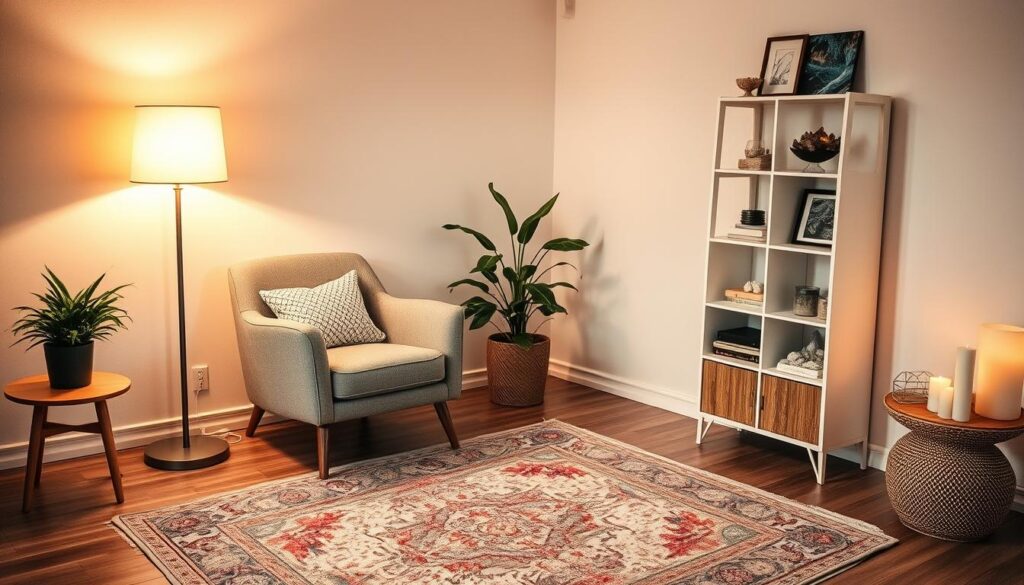
Preventing Clutter Accumulation
Clutter can quickly accumulate and undermine the tranquility of your relaxation corner. Implement storage solutions and habits that prevent clutter, such as using baskets or bins for self-care items and establishing a “one in, one out” policy.
When to Completely Redesign Your Space
Over time, your needs and preferences may change, necessitating a complete redesign of your relaxation corner. Signs that it’s time for a redesign include feeling uninspired or uncomfortable in the space, or if your self-care needs have evolved. Take this opportunity to reassess your priorities and create a space that continues to support your well-being.
Conclusion
Setting up a relaxation corner for self-care is a journey towards a more balanced and peaceful life. By dedicating a space to relaxation, you’re investing in your overall well-being. The steps outlined in this article will guide you in creating a self-care relaxation corner that suits your needs.
To effectively set up a relaxation corner, consider the elements that promote relaxation, such as comfortable seating, soothing colors, and calming scents. Creating a self-care space that is tailored to your preferences will enhance its effectiveness.
By incorporating the ideas and tips provided, you can transform a corner of your home into a serene oasis. This dedicated space will become your sanctuary, where you can unwind, recharge, and prioritize your self-care.
Start your journey to a more relaxed you by designing a self-care relaxation corner that brings you peace and tranquility.



